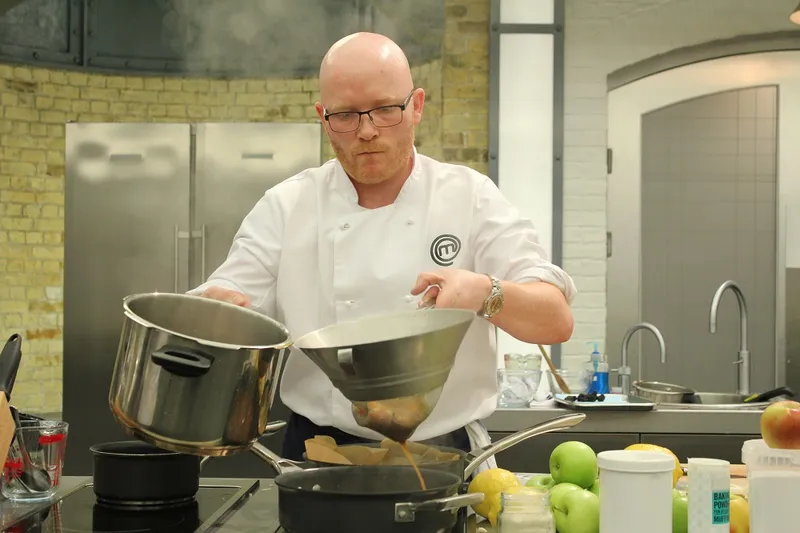Scotland’s National Chef Gary Maclean spills the sauce on his Indian connection
YS Life caught up with Gary Maclean, Scotland’s first National Chef, author, and educator, during his visit to India to know more about his love for the country and his culinary journey over the last three decades.
Chef and author Gary Maclean is no stranger to fame. The culinary genius from Glasgow, who has been at the heart of the Scottish hospitality industry for 35 years, spent his early years in hotel kitchens to learn the ropes of the trade.
At 22, Maclean worked as the head chef at 55BC, a trendy gastro bar, in Bearsden, a posh suburb in Glasgow. Later, he joined G1, multi-millionaire hospitality group owner Stefan King's expanding repertoire of bars and restaurants. The multi-award-winning MasterChef has also helmed the kitchens of Glasgow's Gallery of Modern Art and the Burrell Collection.
That's not all. Maclean has been the executive chef at the City of Glasgow College for over 25 years. He is also a Fellow of the Master Chefs of Great Britain and the International Institute of Hospitality Management, India.
While he is bestowed with several accolades, the turning point in Maclean's career came in 2016 when he took on 47 other professional chefs on BBC MasterChef: The Professionals to become the undisputed champion.

Chef Gary Maclean
His win led the Scottish government to appoint him as the country's first National Chef—the ambassador of Scottish gastronomy, food health, and education.
Today, Maclean owns a sustainable seafood restaurant Creel Caught and a Scottish Deli Soup & Caboodle in Edinburgh.
His string of achievements does not end here. Maclean is also the author of Kitchen Essentials: The Joy of Home Cooking, Gary Maclean’s Scottish Kitchen, and Great FE Teaching. He is working on a new book called Scottish Kitchen Celebrations, scheduled to release in October 2023.
On the sidelines of a special dinner—presented by Maclean at Roseate House, New Delhi last week—YS Life caught up with the Scottish MasterChef to know more about his experiments in the kitchen, his association with India, and more.
Edited excerpts from the interview:
YS Life [YSL]: How did you begin your experiments in the kitchen? Was it something you always enjoyed?
Gary Maclean [GM]: I was fortunate to have discovered food very early. I remember being fascinated by different combinations, and I probably bought my first cookbook, Mastering the Art of French Cooking, at the age of 12.
I was trying to make baguettes in my family home in the early 80s. Trust me, it was difficult as I was very young. I continue to wake up excited about food and working in kitchens, even after 35 years in this trade.
YSL: A turning point in your career was the BBC series MasterChef: The Professionals in 2016. How was your experience competing with 47 other chefs?
GM: MasterChef: The Professionals is a huge show in the UK. It was once dubbed the cruellest reality show. I have always been a MasterChef fanatic, having loved and watched the show for several years on the couch at home on the TV. To get in there and see how things are done and compete was an incredible experience.
Although a competition, you become friends with the participants, supporting and encouraging them along the way. It feels like everyone is a part of something special. I would say it has been life-changing for me.

MasterChef Gary Maclean whipping up one of his creations
YSL: When it comes to Scottish cuisine, what are some standout dishes that must be sampled?
GM: Haggis is probably our most famous dish. It's almost a comedy for people until they taste it. The dish is made from oatmeal and lamb's lungs, heart, and liver. If you ever go to Scotland, you should try it.
I have brought it to India on many occasions for the Young Chef Olympiad showcase. Imagine 55 countries making their national dish, and Haggis always comes out as a winner. People are surprised it's so good.
Another dish I love is Cullen Skink—a four-ingredient broth made with smoked haddock, potato, onion, and milk. It's simple but incredible!
YSL: Are there any particular ingredients you consider versatile and are probably part of most meals you cook?
GM: When you are cooking at home, seasoning the food is vital. You are trying to build layers of flavour and excitement into your dishes. I use different types of salt for finishing. I rely on sea salt for curing and marinating and table salt for seasoning pasta and similar dishes.

Chef Gary Maclean
YSL: Many global chefs are making their way to India to curate meals for audiences here. Do you think India's appetite for experimentation has grown?
GM: Definitely. When I first came to India, I interacted with young chefs in a five-star hotel. They were desperate to see what we were doing in the West. My advice to them was to look deep into their own food culture.
This time, I had an amazing meal that showcased regional, modern Indian cuisine. Today, chefs are presenting local and regional food and, at the same time, offering a great dining experience. Every single dish has a story and is different from the other.

Roast saddle of lamb by Chef Gary Maclean
YSL: You've been to India several times. Does the cuisine appeal to you?
GM: I have been to India on six different occasions. Before this special dinner, I was here a few weeks ago for the Young Chef Olympiad. This time, I am here to showcase Scottish food and culture but with a little Indian twist.
I grew up with Indian cuisine, having been brought up in Glasgow. The Scottish city has a massive Indian population, and I have dined at some of the best restaurants that serve the cuisine.
I have special memories of eating Indian food as a kid when we went out. Many times, only Indian food was available, believe it or not. Even today, Indian restaurants outnumber Scottish restaurants, and we have a real love for spices.
YSL: Speaking about the menu you curated for the India showcase, what went behind it?
GM: We tried to get the philosophy of Scottish cuisine, for which we used many of our ingredients. I am also a firm believer in using local food. For example, I did a traditional Cullen Skink. I brought whisky barrel chips but smoked them with river sole. I also carried ingredients like seaweed and mustard. The dishes presented in the India showcase also used a lot of single-malt Scotch whiskey.

Roast celeriac pearl barley by Chef Gary Maclean
For dessert, there was Shortbread with apple, vanilla, and heather honey dome, with compressed and pureed apples, apple sorbet, and crème fraiche—served globally—including Number 10 Downing Street for the Prime Minister's Burns Supper celebrations.
The meal ended with traditional sweets like Scottish Macaroons and Tablet—which Scottish kids love.
YSL: Did you integrate any local ingredients from India as part of the menu here?
GM: Besides the river sole, we used a lot of different spices. I made a tikka masala dressing for a non-vegetarian starter. Interestingly, we also attempted a Scottish version of the pakora.
YSL: Sustainability has become a buzzword for the right reasons, particularly in the culinary space. How important is it for you?
GM: Sustainability has become a buzzword, but many people put the sustainable tag on menus without any due thought or process. The hospitality industry can have a massive impact on the environment—from where we buy our food to how we tackle food waste.
When people in the hospitality industry call themselves sustainable, there should be a real reason behind it, not because it’s trending. They have to think of the long-term effects at every stage. We have a choice to make it better for the planet.
Edited by Suman Singh


